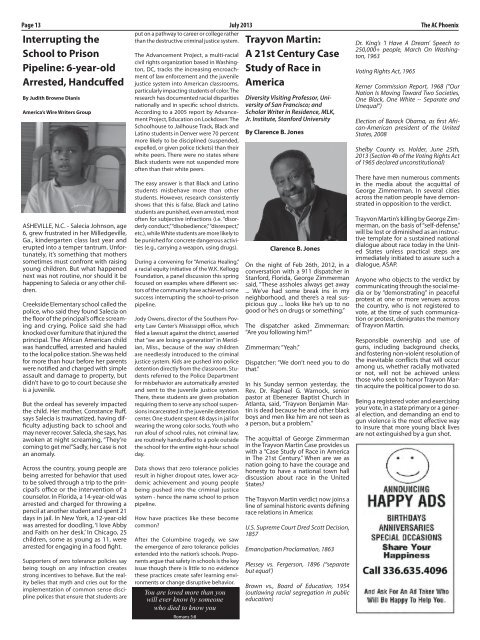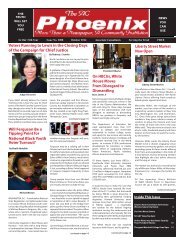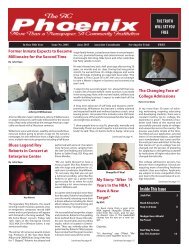The AC Phoenix: More than a Newspaper, a Community Institution -- Issue No. 2001, July 2013
What Black Parents Must do this Summer, By Dr. Jawanza Kunjufu The Business of Sports, By Carl B. Smalls, Morgan Smalls Sports Consultants, LLC Stevie Wonder Boycotts Florida Until 'Stand Your Ground' Law is Abolished, by Andrea Billups A New Leader Takes the Lead at the Children's Home, By John Raye Also Inside This Issue: The State of Equality and Justice in America Interrupting The School to Prison Pipeline Trayvon Matin: A 21st Century Case No Place to Hide Interrupting the School to Prison Pipeline: 6-year-old-Arrested, Handcuffed
What Black Parents Must do this Summer, By Dr. Jawanza Kunjufu
The Business of Sports, By Carl B. Smalls, Morgan Smalls Sports Consultants, LLC
Stevie Wonder Boycotts Florida Until 'Stand Your Ground' Law is Abolished, by Andrea Billups
A New Leader Takes the Lead at the Children's Home, By John Raye
Also Inside This Issue:
The State of Equality and Justice in America
Interrupting The School to Prison Pipeline
Trayvon Matin: A 21st Century Case
No Place to Hide
Interrupting the School to Prison Pipeline: 6-year-old-Arrested, Handcuffed
You also want an ePaper? Increase the reach of your titles
YUMPU automatically turns print PDFs into web optimized ePapers that Google loves.
Page 13 <strong>July</strong> <strong>2013</strong> <strong>The</strong> <strong>AC</strong> <strong>Phoenix</strong><br />
put on a pathway to career or college rather<br />
<strong>than</strong> the destructive criminal justice system.<br />
Interrupting the<br />
School to Prison<br />
Pipeline: 6-year-old<br />
Arrested, Handcuffed<br />
By Judith Browne Dianis<br />
America’s Wire Writers Group<br />
ASHEVILLE, N.C. - Salecia Johnson, age<br />
6, grew frustrated in her Milledgeville,<br />
Ga., kindergarten class last year and<br />
erupted into a temper tantrum. Unfortunately,<br />
it’s something that mothers<br />
sometimes must confront with raising<br />
young children. But what happened<br />
next was not routine, nor should it be<br />
happening to Salecia or any other children.<br />
Creekside Elementary school called the<br />
police, who said they found Salecia on<br />
the floor of the principal’s office screaming<br />
and crying. Police said she had<br />
knocked over furniture that injured the<br />
principal. <strong>The</strong> African American child<br />
was handcuffed, arrested and hauled<br />
to the local police station. She was held<br />
for more <strong>than</strong> hour before her parents<br />
were notified and charged with simple<br />
assault and damage to property, but<br />
didn’t have to go to court because she<br />
is a juvenile.<br />
But the ordeal has severely impacted<br />
the child. Her mother, Constance Ruff,<br />
says Salecia is traumatized, having difficulty<br />
adjusting back to school and<br />
may never recover. Salecia, she says, has<br />
awoken at night screaming, “<strong>The</strong>y’re<br />
coming to get me!”Sadly, her case is not<br />
an anomaly.<br />
Across the country, young people are<br />
being arrested for behavior that used<br />
to be solved through a trip to the principal’s<br />
office or the intervention of a<br />
counselor. In Florida, a 14-year-old was<br />
arrested and charged for throwing a<br />
pencil at another student and spent 21<br />
days in jail. In New York, a 12-year-old<br />
was arrested for doodling, ‘I love Abby<br />
and Faith on her desk.’ In Chicago, 25<br />
children, some as young as 11, were<br />
arrested for engaging in a food fight.<br />
Supporters of zero tolerance policies say<br />
being tough on any infraction creates<br />
strong incentives to behave. But the reality<br />
belies that myth and cries out for the<br />
implementation of common sense discipline<br />
polices that ensure that students are<br />
<strong>The</strong> Advancement Project, a multi-racial<br />
civil rights organization based in Washington,<br />
DC, tracks the increasing encroachment<br />
of law enforcement and the juvenile<br />
justice system into American classrooms,<br />
particularly impacting students of color. <strong>The</strong><br />
research has documented racial disparities<br />
nationally and in specific school districts.<br />
According to a 2005 report by Advancement<br />
Project, Education on Lockdown: <strong>The</strong><br />
Schoolhouse to Jailhouse Track, Black and<br />
Latino students in Denver were 70 percent<br />
more likely to be disciplined (suspended,<br />
expelled, or given police tickets) <strong>than</strong> their<br />
white peers. <strong>The</strong>re were no states where<br />
Black students were not suspended more<br />
often <strong>than</strong> their white peers.<br />
<strong>The</strong> easy answer is that Black and Latino<br />
students misbehave more <strong>than</strong> other<br />
students. However, research consistently<br />
shows that this is false. Black and Latino<br />
students are punished, even arrested, most<br />
often for subjective infractions (i.e. “disorderly<br />
conduct,” “disobedience,” “disrespect,”<br />
etc.), while White students are more likely to<br />
be punished for concrete dangerous activities<br />
(e.g., carrying a weapon, using drugs).<br />
During a convening for “America Healing,”<br />
a racial equity initiative of the W.K. Kellogg<br />
Foundation, a panel discussion this spring<br />
focused on examples where different sectors<br />
of the community have achieved some<br />
success interrupting the school-to-prison<br />
pipeline.<br />
Jody Owens, director of the Southern Poverty<br />
Law Center’s Mississippi office, which<br />
filed a lawsuit against the district, asserted<br />
that “we are losing a generation” in Meridian,<br />
Miss., because of the way children<br />
are needlessly introduced to the criminal<br />
justice system. Kids are pushed into police<br />
detention directly from the classroom. Students<br />
referred to the Police Department<br />
for misbehavior are automatically arrested<br />
and sent to the juvenile justice system.<br />
<strong>The</strong>re, these students are given probation<br />
requiring them to serve any school suspensions<br />
incarcerated in the juvenile detention<br />
center. One student spent 48 days in jail for<br />
wearing the wrong color socks. Youth who<br />
run afoul of school rules, not criminal law,<br />
are routinely handcuffed to a pole outside<br />
the school for the entire eight-hour school<br />
day.<br />
Data shows that zero tolerance policies<br />
result in higher dropout rates, lower academic<br />
achievement and young people<br />
being pushed into the criminal justice<br />
system - hence the name school to prison<br />
pipeline.<br />
How have practices like these become<br />
common?<br />
After the Columbine tragedy, we saw<br />
the emergence of zero tolerance policies<br />
extended into the nation’s schools. Proponents<br />
argue that safety in schools is the key<br />
issue though there is little to no evidence<br />
these practices create safer learning environments<br />
or change disruptive behavior.<br />
You are loved more <strong>than</strong> you<br />
will ever know by someone<br />
who died to know you<br />
Romans 5:8<br />
Trayvon Martin:<br />
A 21st Century Case<br />
Study of Race in<br />
America<br />
Diversity Visiting Professor, University<br />
of San Francisco; and<br />
Scholar Writer in Residence, MLK,<br />
Jr. Institute, Stanford University<br />
By Clarence B. Jones<br />
Clarence B. Jones<br />
On the night of Feb 26th, 2012, in a<br />
conversation with a 911 dispatcher in<br />
Stanford, Florida, George Zimmerman<br />
said, “<strong>The</strong>se assholes always get away<br />
... We’ve had some break ins in my<br />
neighborhood, and there’s a real suspicious<br />
guy ... looks like he’s up to no<br />
good or he’s on drugs or something.”<br />
<strong>The</strong> dispatcher asked Zimmerman:<br />
“Are you following him?”<br />
Zimmerman: “Yeah.”<br />
Dispatcher: “We don’t need you to do<br />
that.”<br />
In his Sunday sermon yesterday, the<br />
Rev. Dr. Raphael G. Warnock, senior<br />
pastor at Ebenezer Baptist Church in<br />
Atlanta, said, “Trayvon Benjamin Martin<br />
is dead because he and other black<br />
boys and men like him are not seen as<br />
a person, but a problem.”<br />
<strong>The</strong> acquittal of George Zimmerman<br />
in the Trayvon Martin Case provides us<br />
with a “Case Study of Race in America<br />
in <strong>The</strong> 21st Century.” When are we as<br />
nation going to have the courage and<br />
honesty to have a national town hall<br />
discussion about race in the United<br />
States?<br />
<strong>The</strong> Trayvon Martin verdict now joins a<br />
line of seminal historic events defining<br />
race relations in America:<br />
U.S. Supreme Court Dred Scott Decision,<br />
1857<br />
Emancipation Proclamation, 1863<br />
Plessey vs. Fergerson, 1896 (“separate<br />
but equal’)<br />
Brown vs., Board of Education, 1954<br />
(outlawing racial segregation in public<br />
education)<br />
Dr. King’s ‘I Have A Dream’ Speech to<br />
250,000+ people, March On Washington,<br />
1963<br />
Voting Rights Act, 1965<br />
Kerner Commission Report, 1968 (“Our<br />
Nation Is Moving Toward Two Societies,<br />
One Black, One White -- Separate and<br />
Unequal”)<br />
Election of Barack Obama, as first African-American<br />
president of the United<br />
States, 2008<br />
Shelby County vs. Holder, June 25th,<br />
<strong>2013</strong> (Section 4b of the Voting Rights Act<br />
of 1965 declared unconstitutional)<br />
<strong>The</strong>re have men numerous comments<br />
in the media about the acquittal of<br />
George Zimmerman. In several cities<br />
across the nation people have demonstrated<br />
in opposition to the verdict.<br />
Trayvon Martin’s killing by George Zimmerman,<br />
on the basis of “self-defense,”<br />
will be lost or diminished as an instructive<br />
template for a sustained national<br />
dialogue about race today in the United<br />
States unless practical steps are<br />
immediately initiated to assure such a<br />
dialogue, ASAP.<br />
Anyone who objects to the verdict by<br />
communicating through the social media<br />
or by “demonstrating” in peaceful<br />
protest at one or more venues across<br />
the country, who is not registered to<br />
vote, at the time of such communication<br />
or protest, denigrates the memory<br />
of Trayvon Martin.<br />
Responsible ownership and use of<br />
guns, including background checks,<br />
and fostering non-violent resolution of<br />
the inevitable conflicts that will occur<br />
among us, whether racially motivated<br />
or not, will not be achieved unless<br />
those who seek to honor Trayvon Martin<br />
acquire the political power to do so.<br />
Being a registered voter and exercising<br />
your vote, in a state primary or a general<br />
election, and demanding an end to<br />
gun violence is the most effective way<br />
to insure that more young black lives<br />
are not extinguished by a gun shot.

















